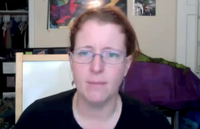Paula J. Caplan, dissident psychologist and human rights activist, is working with a group of psychiatric survivors and allies to officially call upon the American Psychiatric Association [APA] to stop the harm that often results from psychiatric diagnosis.
Jenny McClendon, one of the DSM 9, has told her story of harm by psychiatric diagnosis in an official complaint to the APA and on YouTube.
The group, popularly known as the “DSM 9,” filed 9 official complaints with the ethics department: 7 of them were by people who themselves were harmed by diagnosis, the 8th was one whose brother who had died from diagnosis, and the 9th was from Caplan herself.
The APA’s response was an abrupt dismissal.
Says Paula, “The APA summarily dismissed all 9 complaints in one short, strange paragraph. They never even told us who the members of the ethics committee are – it’s like a secret society! They did not address the content of the complaints, [dismissing them] on spurious procedural grounds.”
Caplan and Jenny McClendon, a military veteran who is a complainant, went with activist Leah Harris and social worker Debra Turkat to the building that houses APA headquarters on November 13th in an attempt to meet with the ethics department’s administrative head and the APA’s general counsel about dismissal of the claims. They were ejected from the building after being prevented from entering APA offices.
The importance of challenging psychiatric diagnoses
Paula J. Caplan’s and the DSM 9’s actions, like those of MindFreedom International at OCCUPY THE APA, are aimed at drawing public attention to the harm that psychiatric diagnosis — a subjective process that is presented by the APA as both scientific and definitive — can cause.
The group wants to send 3 main messages to the general public about psychiatric diagnosis:
- It simply is not scientifically grounded.
- It does not help improve outcomes (doesn’t reduce human suffering).
- It carries enormous risks for the individual so labeled.
 Says Paula (pictured at left), “The ultimate aim is to get professionals and the public to stop assuming that what’s most needed is to know what the person’s diagnosis is. What’s most needed is to listen to what happened to the person and to find ways that help.”
Says Paula (pictured at left), “The ultimate aim is to get professionals and the public to stop assuming that what’s most needed is to know what the person’s diagnosis is. What’s most needed is to listen to what happened to the person and to find ways that help.”
“People need to have a respectful listener, who will bear witness to what they’ve been through…who can present not just medications or even psychotherapy, but the whole range of things that have been shown to help people. Things that are low risk and non-pathologizing. For example: meditation, having a friend, volunteer work, physical exercise, political action, arts, community work, having a service animal. An amazing number of things can help people heal!”
***ACTION***
3 ways YOU can help Paula J. Caplan and the DSM 9 challenge the APA to “stop the harm” of psychiatric diagnosis:
1. Watch the complainants’ YouTube videos and share widely with your networks!
And in early January, watch for more complainants’ videos to be posted on YouTube, all under the title “Watch the Stories of Harm the APA Refused to Hear”
2. Submit your own complaint to the APA about the harm psychiatric diagnosis has caused you.
Visit psychdiagnosis.weebly.com and write through the contact form that you would like information on how to file a complaint against the APA, and the Grassroots Group to End Harm from Psychiatric Diagnosis will provide you with a template that requires only a small amount of work on your part.
3. Help the DSM 9 find a lawyer who is willing to take on their case.
Let’s support Paula J. Caplan and her allies in their important work to draw public attention to the APA’s flawed system of diagnosis and help them “Stop the Harm!”
Document Actions


